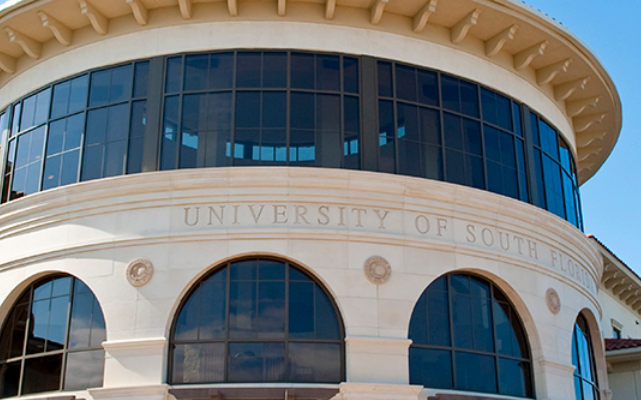
People & Business
USF Sarasota-Manatee Business Students Help Pasco County Libraries Choose New Computer System
A group of business students from the University of South Florida Sarasota-Manatee helped select a computer system for Pasco County’s public libraries.
The students, members of Jean Kabongo’s Strategic Management/Decision Making class, spent about two months analyzing the libraries’ needs and investigating systems suitable for staff and library patrons. They detailed their findings in a 57-page report delivered to library administrators last month.
“The goal was to help them understand or give them an idea about whether one computer was a better idea or not,” recent USF graduate and project lead Louis Crouch said. “Ultimately, I think they were happy with the choice they made, and I think the work we did for them saved them from additional work they would have had to do themselves.”
Crouch said the report affects about 275 computers, including public-use terminals and computers used by office staff and IT personnel in seven branches. The project is expected to start in the fall and last about two years.
Administrators were in the midst of creating a plan to swap out the computers when they reached an impasse over a suitable replacement system.
“The report delivered by these students was very useful to the library system and saved us a considerable amount of time,” said Nancy Fredericks, a libraries administrator in Pasco. “They did the research and possessed the knowledge needed to assess our needs. Ultimately, they gave us three options to choose from, which included the costs for each one.”
The effort was part of an annual capstone project in which groups of students work with business owners to identify issues affecting budget and profitability. Working in groups of five, the students meet with the owners, analyze the business’ problems and then deliver a report with their recommendations during the semester’s final weeks.
Kabongo, an associate professor of management in the College of Business, oversees the students’ work. He said he was delighted his class could help the administrators.
“I’m really impressed with the work they did and clearly proud of the students because they really nailed down this project and applied the concepts they learned,” Kabongo said. “The learning outcomes of the class really exemplified the results of this project.”
Over the years, he said he’s seen a range of capstone proposals. He asks students to select businesses familiar to at least one member of their group and to concentrate on one or two specific problems.
The library project wasn’t typical of a capstone. Most students focus on small to medium-sized businesses, such as retail stores, restaurants, small manufacturers and service companies, But occasionally some students analyze nonprofits and government agencies.
The idea, the professor said, is to have the students work together, relying on their academic specialties and backgrounds, to solve a problem. All of the students are seniors.
“The course teaches students to learn how organizations of all different sizes, public and private, formulate, implement and evaluate management strategies,” Kabongo said.
“The capstone students come to the class with prior knowledge from other business disciplines, such as accounting, finance and information systems, and with this prior knowledge they learn how organizations work, how to form plans and to implement and evaluate strategies.”
Library administrators welcomed the students’ assistance. They had talked about replacing the branches’ computers for months and narrowed the list to three possible systems, but hit an impasse when assessing costs and the systems’ impacts to their core users.
Crouch, a recent graduate and an IT technician at Pasco County Libraries, approached his supervisor, who was open to the capstone idea.
Along with other students – Johnna Bakos, Harrison DeBusk, Liam Filipowski and Andrew Garcia, all seniors – Crouch analyzed the needs of library patrons and staff, studied the library’s overall goals and then examined the costs and benefits associated with each of the proposed systems, creating a ranking. The students delivered their presentation April 24.
“I think it helped that we approached the issue externally and gave them a viewpoint that wasn’t internally driven,” Crouch said. “I think it gave them a fresh perspective. Everybody won. They got a report and we got a grade.”
Library officials agreed. “With the information they provided, we made the best choice for the library system,” Fredericks said.
DeBusk, a senior accounting student set to graduate next year, said he enjoyed working on the project.
“It gave everyone in our group an opportunity to examine the decision-making process as it was occurring in an existing organization,” he said. “From what Louis and his supervisor had described of the libraries’ situation, there seemed to be two schools of thought regarding which approach would best serve the library patrons, and we saw room for compromise.
“What excited me the most about this project was the scale of assisting a countywide organization, and I hope that our efforts ultimately serve to improve the experiences of the thousands of Pasco residents who will make use of their libraries during the lifetime of these upgrades,” he said.
Kabongo gave the students an “A” for their project.



You must be logged in to post a comment Login